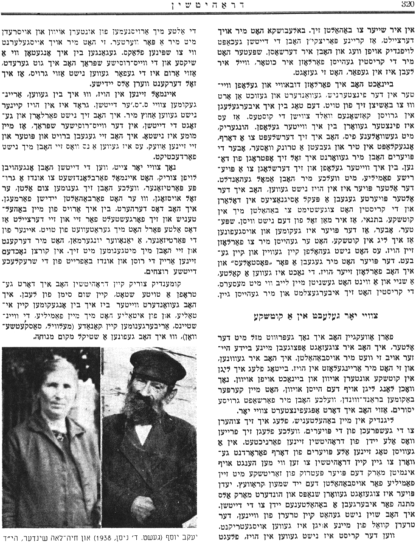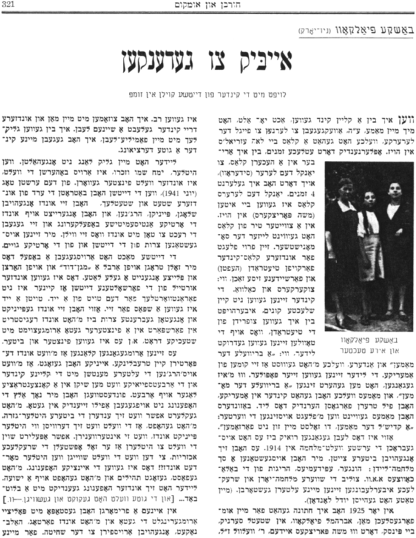
[Page 320]
had been captured by the Germans as she fled, and was shot. Later the Christian told me to leave the hamlet because her life was in danger.
At night I left Dubovay and fled further into the darkness, wandering and searching for somewhere I could protect myself. During the day I hid in the bushes in the large Forest. After it became dark I continued fleeing. I was hungry with swollen feet, and managed to get to a village where I knocked on the door and asked for a drink of water. However, the peasants warned me to get out of the village. I continued on my way and encountered a peasant family who I knew previously. The old peasant wasn't at home, but I gave his wife a package of banknotes and dollars, and the peasant woman agreed to hide me under a heap on the condition that her husband didn't find out. Later, however, when her husband returned and discovered me lying there, he told me to leave his house. All my crying and begging had no effect. The peasant gave me a couple of berries and I left his house. It was cold that night, and the snow and cold cut through my body like a knife. The Christians crossed themselves and told me to leave.
Two years living in a heap
Before leaving I tried my luck with the old lady, and promised to give him both of my houses if he would let me hide in his house. I convinced her, and she let me in. During the day I stayed in a heap under the oven, and my body was burning hot. I suffered enormously, but I stayed there for two years.
While I was in my hiding place I would listen to the peasants talk about how happy they were that the Jews from Drohitchin had been eliminated. One day all the peasants in town were told to go to Drohitchin to see the peasant Petruk of Zaritchka be hanged in the middle of the market with his family for having hidden the Jew Shimon Kravetz. Every peasant was promised liquor and a hundred marks as a gift for handing over a Jew in hiding to the Germans. I no longer had any tears to cry with. The source of my tears had already dried up.
When the Christian wasn't home, the old lady would let me out from under the oven, and talk to me. She even taught me how to spin flax. I dressed like a gentile peasant woman, and spoke the White Russian language well. The danger was reduced because of the fact that I wasn't recognized as a Jew.
Once two men from the SS came to the house, and I was the only one home. I didn't get flustered, and told the Germans in White Russian that my aunt wasn't home. I gave them bread and butter, and they left. It was a miracle that they didn't discover who I was.
After a period of two years, when the Germans started retreating, a group of partisans happened to come by. They approached the old man to tell them where he had hidden Jewish property. I heard that and came out of my hiding place and stood before them and told them how the old peasant lady had saved my life. One of the partisans, a young man from Yanova, recognized me, and they took me along. Shortly thereafter the Russians arrived and liberated us from the awful German murderers.
When I returned to Drohitchin all I saw was a dead town with no sign of life. I continued my journey until I got to Italy. My relatives, the Weinsteins, brought me to Canada (Melville, Saskatchewan), where I found a place to live in peace.
[photo:] Yaakov Yosef (died April 5, 1938) and Chaya-Leah Shinder. May G-d avenge their blood!

[Page 321]
Bashka Fialkov (New York)
[photo:] Bashka Fialkov and her daughters
JewishGen, Inc. makes no representations regarding the accuracy of
the translation. The reader may wish to refer to the original material
for verification.
JewishGen is not responsible for inaccuracies or omissions in the original work and cannot rewrite or edit the text to correct inaccuracies and/or omissions.
Our mission is to produce a translation of the original work and we cannot verify the accuracy of statements or alter facts cited.
 Drogichin, Belarus
Drogichin, Belarus
 Yizkor Book Project
Yizkor Book Project
 JewishGen Home Page
JewishGen Home Page
Copyright © 1999-2025 by JewishGen, Inc.
Updated 13 Dec 2001 by LA